- Home
- David Levithan
Wide Awake Page 6
Wide Awake Read online
Page 6
Yes.
Wait.
Me.
There.
Mmm.
Yes.
Turn.
You.
Breathe.
Grasp.
Sweat.
Yes.
Over.
Lower.
More.
Slow.
Yes.
Y e s.
Now.
I loved being naked with him. I loved watching him when his eyes were closed, when he lost control, when he let go and let me take him. I loved when my whole body felt a part of it, when I would grasp and glide and press without having to think about it. When I let go and let my body take me.
And still, what I loved the most was the heartbeating. The heartbeating through kisses. The heartbeating through touch. The sharp, deep heartbeating when I came and the loose, lazy heartbeating of lying there after, drifting in that love-sewn quiet of lying next to him, the gentle return.
This time, we knew Jimmy’s parents were out until at least ten. We knew we had the house to ourselves. We could have talked more about the day. We could have turned on the news. But instead we slammed into each other as soon as the door was closed, dropping our book bags, shedding our jackets, stumbling to his room in between mad kisses, kicking off our shoes, pulling off each other’s shirts, unbuckling our belts, sliding off our pants, pausing for that awkward moment of sock removal, then wrestling into bed, our underwear the thinnest barrier, soon shed. It wasn’t like it had ever been before—we were saying too many things at once. This wasn’t want, this was need. We were colliding our way to comfort, shouting with our bodies, pulling ourselves close closer closer. I was pinning him against the mattress and he was leaning up to match my kiss with his, and I was rolling over and he was pressing our bodies together, toe to head, and we were sweating and I was ready and he was ready and we were both so ready for everything in the world to fall into place, just once, just now. I arched my back and he licked my neck. I grabbed him closer and he pulled at my hair. I was all feeling, and none of those feelings were fear. It felt like war, but I was rooting for both sides.
This was what they were afraid of. But I wouldn’t be afraid. I wouldn’t.
We stopped to be safe, then continued our push and pull until we got to the rush and then the afterwards. Lying there, I could feel my heartbeat decelerating, calming. I leaned my head on his shoulder and slowly stroked the small canyon of hair down the middle of his chest. Even in the half-light of his nighttime bedroom, I admired the ghost hairs on his neck as he let his hand fall on my leg, his skin three hues darker and one degree warmer than mine.
We stayed like this for as long as we could. This was the closest to sleep that waking could be, and I almost crossed the border. But then Jimmy asked me a question, and his voice was full of such unexpected vulnerability that I felt the full weight of my love for him…and wasn’t afraid of it, either.
“It’s all going to be okay, isn’t it?” he asked.
And I responded by holding him close and saying that whatever it took, we would make it okay.
ten
The next two days were like watching a car wreck about to happen and not having any way to stop it.
The governor of Kansas’s plan to throw the election to Stein’s opponent by disqualifying as many Stein votes as possible soon became clear. Among the groups he was targeting were:
(a) Urban voters whose polling places had stayed open past the election deadline because lines had been so long, even after the board of elections had announced that they were closed.
(b) College voters who, the governor alleged, may have voted twice by using absentee ballots in their home states.
(c) Provisional voters whose identities, he said, had been confirmed “too quickly.”
Virgil was already organizing a Stop the Madness campaign, galvanizing voters in our state to make it clear they were ready to protest any move the Kansas governor made. Virgil insisted that none of us skip school in order to help, so we had to wait until the last bell rang to head over to headquarters. I tried not to bristle every time Keisha and Sara were out of the room together, but I couldn’t help it—I was suspicious of their every move.
I would ask Mira where Keisha had gone to, and she would tell me Keisha and Sara had just run to the store for more envelopes, or that she was in the kitchen making coffee.
I avoided the second floor.
School, however, couldn’t be avoided. At school, we were all at one another’s throats.
Two days after the election—the morning after Kansas was put back into play—Janna and I walked in to find Mary Catherine leading a prayer circle that walked through hallways, chanting. With a loudness we hadn’t known she still possessed, she was beseeching the Lord to swing Kansas to Stein’s opponent. The few people in her flock shouted their assent, while the rest of the students just wanted them to get out of the way.
Janna looked pissed.
“I prayed last night, too,” she said to me, glaring in Mary Catherine’s direction. “I prayed for a good long time to God to do the right thing in Kansas. That’s all I said—the right thing. And I guess that’s the difference between Mary Catherine and me: I don’t feel I need to tell the Lord what the right thing is. I have faith the Lord knows.”
Jesse Marin was predictably harsh to me in homeroom. “You’re going down,” he taunted.
I ignored him and made sure my seat was in place after the pledge.
When we got to Mr. Davis’s room, we found Principal Cotter in the back, which actually made me feel a little better. I wondered if Ms. Kaye or some other teachers had talked to him. Whatever the case, Mr. Davis could barely contain his annoyance at being observed. He spat out facts about the War of 1812 like he resented each and every one of them. I kept my head down, because every time Mr. Davis looked my way I could feel his disgust. He wouldn’t even turn in Jimmy’s direction…until Jimmy took off his sweater.
It was warm in the room; it made sense for Jimmy to remove his sweater. Principal Cotter couldn’t really argue that he was being provocative. But the motion got Mr. Davis’s attention. Midsentence, he looked over and saw Jimmy…and Jimmy’s shirt.
It was simple, really: a white T-shirt with a small American flag in the center. That’s it.
But it tripped Mr. Davis up. It gnashed him.
That was the thing about the Decents—they were as possessive of the flag as they were of the country. They thought it should only belong to some people, the deserving people. When the whole point of the flag—and the country—was that it belonged to everyone. During the Reign of Fear, as the Greater Depression worsened and the War to End All Wars failed so brutally, all kinds of wacky legislation appeared trying to “protect” the flag. One congressman wanted the government to license flags, so they wouldn’t get in the hands of “un-Americans.”
This didn’t go over well in most places, and luckily it never passed.
While Mr. Davis was clearly surprised to see the flag on Jimmy’s T-shirt, I wasn’t; I knew that he believed in America, in the same way that Stein believed in America. I knew the flag to him was a way of translating a concept made of so many words and understandings and complications into one clear image, the same way you can express love with a single drawn heart. By wearing the flag, he wasn’t just saying, This is mine, too. He was saying, This is all of ours.
Mr. Davis started bombarding him with questions about British troop movements—each of which he answered correctly. Then Mr. Davis moved—as all lessons about the War of 1812 seemingly do—to “The Star-Spangled Banner.”
“Our national anthem,” Mr. Davis invoked. As if we didn’t know.
Jimmy raised his hand.
I was afraid he was going to point out that “The Star-Spangled Banner” hadn’t been written as a national anthem, and in fact had been set by Francis Scott Key to the tune of a British drinking song. Mr. Davis clearly didn’t want to take any chances—he ignored Jimmy’s hand and
kept lecturing.
“Ahem,” Mira coughed, looking at Jimmy. I got what she was trying to do. I turned to Jimmy, too, as did a large part of the class. Even the ones who hadn’t left with us the previous day were playing along. They wanted to see what would happen.
“Mr. Davis,” Principal Cotter said, “I believe you have a question.”
“Yes, Mr. Jones? What brilliant words do you have to share with us about ‘The Star-Spangled Banner’?”
“I just find it interesting that we only kept the first verse,” Jimmy said. “I mean, for the National Anthem. There were three other verses, right? And the one we made into our national anthem is the one that has all the questions.”
“What do you mean, questions?”
“I mean, we don’t really know if the flag is still there.”
Mr. Davis huffed. “Of course it’s still there. Clearly you haven’t done your reading—Francis Scott Key woke up early on the morning of September fourteenth, 1814, and saw the flag flying over Fort McHenry to mark victory over the British.”
“I know that,” Jimmy answered calmly. “What I’m saying is, the National Anthem is a question. It doesn’t say, “’Tis the star-spangled banner / O long may it wave / O’er the land of the free and the home of the brave’—that’s the end of Key’s second verse. No, instead we use the verse that goes, ‘O say does that star-spangled banner yet wave / O’er the land of the free and the home of the brave?’ Our national anthem ends with a question mark.”
“There is no question,” Mr. Davis insisted.
“But there is. That’s the whole thing. That’s why it’s such a brilliant national anthem—because we all believe that it’s there, even though there’s nothing that tells us it still is.”
I knew Jimmy was pushing Mr. Davis closer and closer to the edge. This time, I decided to do something: I started clapping. Keisha, Mira, and some of the others joined in.
“Enough!” Mr. Davis yelled.
“Okay, quiet,” Principal Cotter chimed in. But Mr. Davis was already long past that.
“Shut up! All of you! Shut up!” he shouted. Then he turned on Jimmy. “How dare you?” he spat out. “How dare you come into my class and talk like that?”
“I dare because my country allows me to,” Jimmy replied.
Principal Cotter was on his feet now.
“Everybody quiet here,” he said. “Let’s focus on the lesson and not turn this into politics, okay? This is a history class, not a rally.”
But why else do we learn history? I wanted to ask.
Mr. Davis still seethed.
“Teach,” Principal Cotter told him.
He went back to troop movements and the Madisons fleeing the White House. I don’t think I’d ever paid more attention to him; the edge was keeping me awake.
In the hallway after class, I took Jimmy’s hand and said, “Nice shirt.”
“Tell that to Kansas,” he replied.
Most teachers didn’t want students checking screens in class, so we had to keep up with the news between periods and at lunch. As the threat in Kansas became more and more real, an angry sadness settled in my gut. Jesse and his crew became bolder in their assurance. Mandy and Janna tried to make us optimistic, and Gus refused to believe that the election would be thrown.
Then, after lunch, something wrong happened. Jimmy and I were at my locker, switching books. One of his fingers was in one of my belt loops, just casually there. We were talking about going to headquarters that night when we heard it, that one word:
“Fags.”
It was Satch who’d said it, with Jesse and this other guy Rand next to him.
“What?” Jimmy said, letting his finger fall from my jeans, turning to face the insult. “What did you say?”
“You heard me,” Satch said, like he was proud of it.
I was totally thrown. That word had never been shot at me before, especially not in school by someone I knew. It was so Decent. But at the same time it felt like hate, and it felt personal.
I would’ve stayed paralyzed. But not Jimmy. He was immediately staring Satch down.
“What’re you saying, Satch?” he said. “Don’t hold back now.”
I looked at Jesse, and I have to admit that even he looked a little surprised. But he wasn’t going to let his friend down.
“Get off, Jimmy,” he said.
“No, I want to see if Satch is done. Because I can think of an n-word he can use to describe part of me, and an m-word for the Irish part, and, I dunno, I’m sure he can think of a word for my French grandparents. And maybe just lump the Catalan part with all the other s-p-i-c-s, right? Is that okay, Satch? Is that where you want to go?”
He was right in Satch’s face, only a few inches between them. Satch shoved him away. Jimmy shoved back.
There were other people in the hall now. Watching. Letting it play out.
“Just take your fag President wannabe and get the hell out of here,” Satch said. Then he went to shove Jimmy again, and a number of things happened at once:
Jimmy knocked Satch’s arm before Satch could knock Jimmy.
Jesse and I both jumped in to stop it.
Satch spun back, striking out.
Jesse and I almost collided. To avoid Jesse, I moved a little to the right—
—and got hit right in the face by Satch’s elbow.
So I ended up being the one knocked over, my eye bruised. Jesse and Rand pulled Satch back. Jimmy bent down to see if I was okay.
It all happened so fast. All unleashed by a single hateful word.
“Are you okay?” Jimmy asked. I nodded…even though I was holding my eye.
“Never been better,” I said.
“It hurts?”
“Yeah, it hurts.”
I didn’t want to go to the nurse’s office. (I could hear her: “You?!? In a fight?!?”) So Jimmy got a bag of ice from the cafeteria and we sat out back for sixth period.
“This is getting crazy,” I said.
He didn’t disagree.
Word spread over all the open news channels that Stein was going to make a big announcement in a press conference at eight o’clock.
We all waited in nervous anticipation at headquarters that night. My eye—not quite a black eye, but still a little purple—was the object of a lot of scrutiny and concern. I didn’t like the attention and would have been able to shrug it off if Jimmy hadn’t been beside me the whole time, watching over me and telling people what had happened. I knew he felt bad, and had told him more than once that it wasn’t his fault. I couldn’t even give Satch full blame for the blow, since I can’t imagine he’d meant to hit me. Still, I resented the chain of events that had led to the collision, and the fact that Satch hadn’t said sorry after.
Virgil shook his head when he saw it, and Flora insisted on running upstairs for some ointment. Sara was nowhere to be seen, which might explain why Mira and Keisha appeared inseparable again. I wondered how genuine that was, and hated myself for thinking that way.
Finally, it was eight o’clock. We all quieted down and watched the screen. As flashbulbs went off and reporters scrambled for position, Stein walked up to the podium at his national headquarters and began to speak.
“My fellow citizens of America, the time has come for us to do something about Kansas. A small group of politically motivated people are trying to disenfranchise, manipulate, and lie their way to winning this election. Although it is being done in the name of fairness, it is truly being done out of greed and self-interest. We cannot let it happen. This afternoon, I received independent verification for something I already believed to be true: My campaign has won the majority of votes in the state of Kansas. This cannot be denied, and the fact that it is being denied must be viewed as a call to action.
“I’ll be honest with you: This is not something I say lightly. It would be easy for me to remain silent, to leave the fate of this nation in the hands of two teams of lawyers. But that isn’t what this country is about, and it is
n’t what I’m about. You deserve the truth, and we all must fight for it if we must.
“I ask my opponent to concede this election and abide by the independent commission led by former Governor Hopkins, which states clearly and unequivocally that the election results in Kansas are correct as initially reported. Any attempt by the current governor to invalidate these results should be stopped immediately. This is not an election that can be tampered with or questioned. The people have spoken, and now they must be heard. To do otherwise is against everything this country is about. America cannot and will not abide dishonesty, untruths, or the cynical manipulation of the voting process. Our values are much, much stronger than that.”
At a separate news conference, the former governor—a member of the opposition party—verified that his commission had monitored the voting in Kansas, had checked the results, and was satisfied beyond doubt that Stein’s margin of victory was accurate.
Then more troubling news began to come in: A Kansas election official told a reporter that she had been asked to erase some votes from the electronic polling machine in her district. Another person, a college student, volunteered that his name had been on the current governor’s “double-voting” list, proclaimed that he had not filled out an absentee ballot for his home state, and said that if one was discovered, it would be a forgery sent in by someone other than him as a way of disqualifying his vote. The opposition party, he said, could easily obtain green-state students’ home addresses to pull such a stunt.
The opposition candidate held his own press conference, refusing to concede, saying that God wanted him to see this thing through to the end, through any channels and means necessary.
Finally, around eleven o’clock our time, Stein stepped in front of the cameras again.
“I can see which way the wind is being blown in Kansas. And the only way to stop it is to blow back harder. We must let the truth fill our lungs, our purpose fill our hearts and make us strong.
“This is what I say:
“I am going to Kansas.

 The Lover's Dictionary
The Lover's Dictionary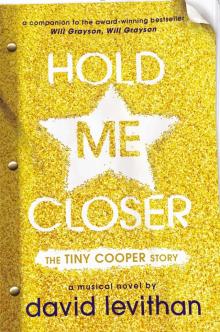 Hold Me Closer: The Tiny Cooper Story
Hold Me Closer: The Tiny Cooper Story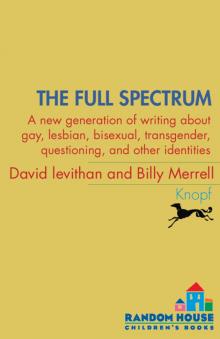 The Full Spectrum
The Full Spectrum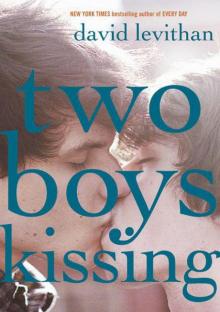 Two Boys Kissing
Two Boys Kissing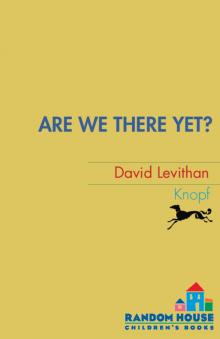 Are We There Yet?
Are We There Yet?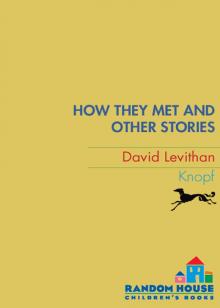 How They Met and Other Stories
How They Met and Other Stories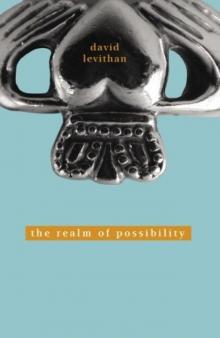 The Realm of Possibility
The Realm of Possibility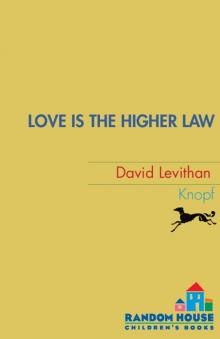 Love Is the Higher Law
Love Is the Higher Law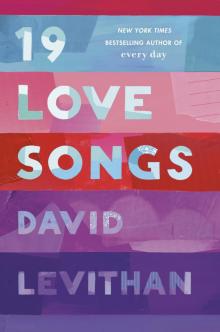 19 Love Songs
19 Love Songs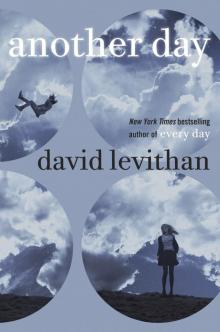 Another Day
Another Day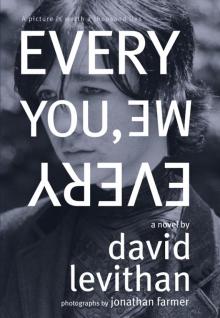 Every You, Every Me
Every You, Every Me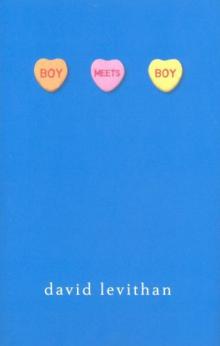 Boy Meets Boy
Boy Meets Boy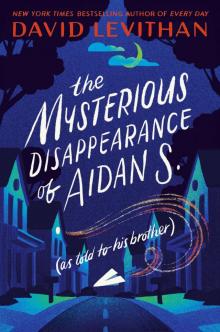 The Mysterious Disappearance of Aidan S. (as told to his brother)
The Mysterious Disappearance of Aidan S. (as told to his brother)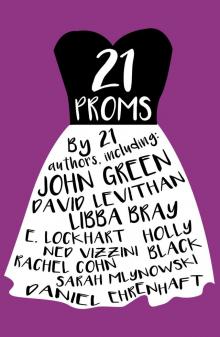 21 Proms
21 Proms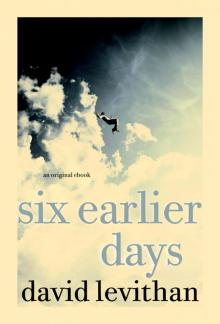 Six Earlier Days
Six Earlier Days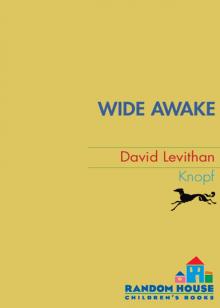 Wide Awake
Wide Awake Take Me With You When You Go
Take Me With You When You Go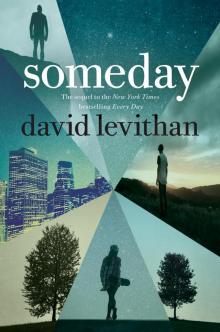 Someday
Someday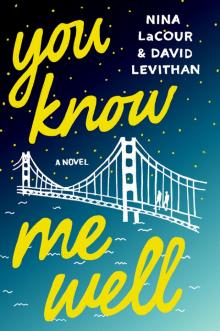 You Know Me Well
You Know Me Well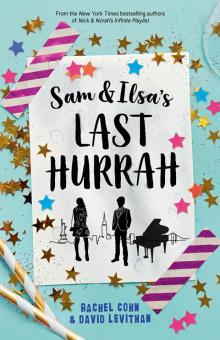 Sam and Ilsa's Last Hurrah
Sam and Ilsa's Last Hurrah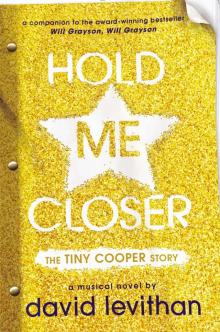 Hold Me Closer
Hold Me Closer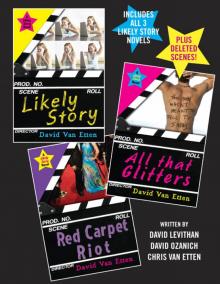 Likely Story!
Likely Story!